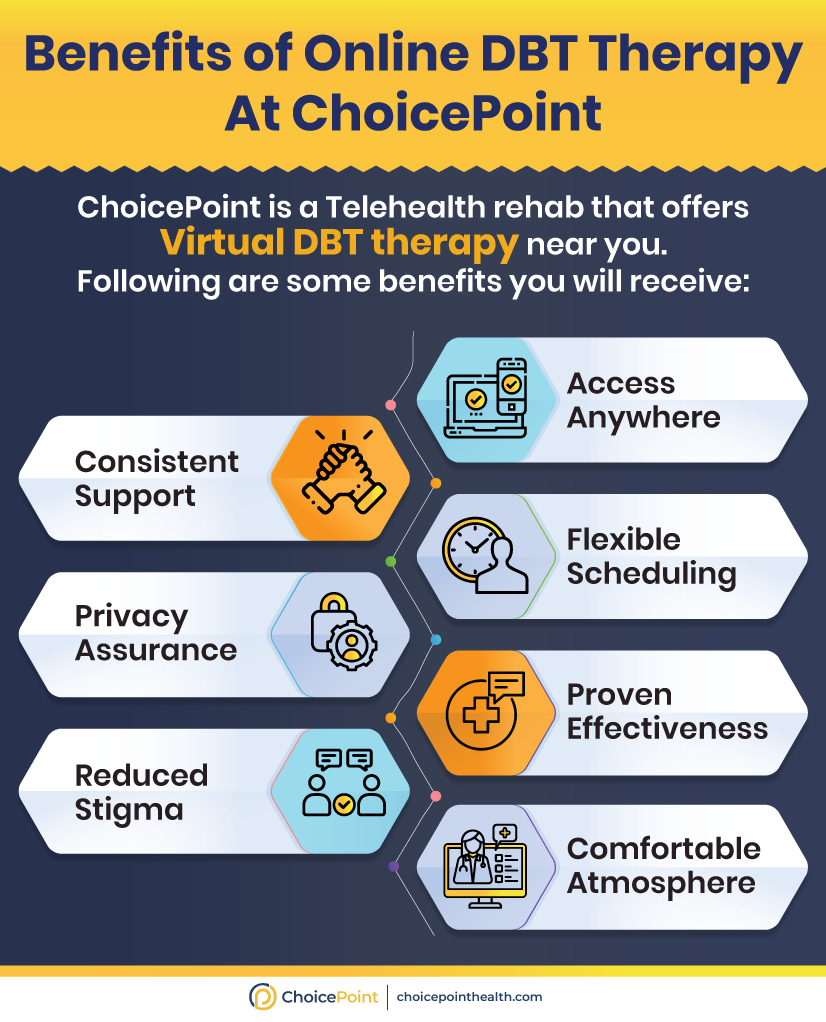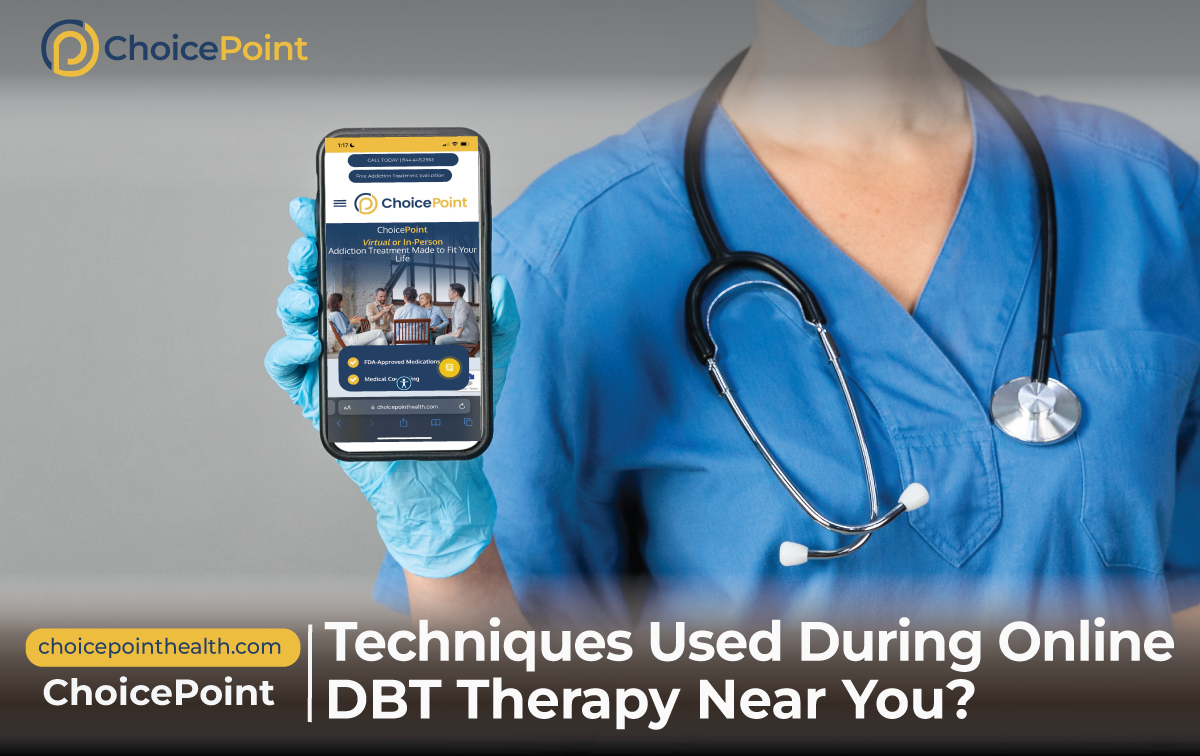DBT, or dialectical behavior therapy, was initially developed to treat borderline personality disorder, and it emerged to be a useful psychotherapy for co-occurring disorders. DBT therapy helped 86% of people; today, it is considered the first treatment choice for co-occurring conditions. Moreover, to make the treatment accessible, therapists are turning to the Internet to provide online therapy. In this article, we will discover the techniques, benefits, and why Online DBT therapy near you is the best choice for comorbidity issues.
ChoicePoint is an addiction treatment facility that helps patients with comorbid issues like anxiety, depression, and more! To schedule an appointment with a doctor who will listen to you patiently, call now at 844.445.2563 or fill out this form!
Table of Contents
4 Techniques Used During Online DBT Therapy Near You
DBT therapy is aimed at regulating people’s behavior by providing them with an understanding of their behaviors. It enables patients to manage emotions and channel them effectively. Following are the four major techniques used in DBT near me:
1. Distress Tolerance Technique
Distress tolerance includes learning ways to withstand difficult emotions and decrease impulsive reactions. This technique teaches patients to build tolerance skills to resolve a crisis without reacting impulsively or engaging in self-destructive behavior. Patients learn to cool down their emotions and figure out wise solutions. Distress tolerance teaches how to:
- Practice different breathing techniques
- Accept reality
- Think of the pros and cons
- Self-soothe by making small positive changes
- Shift attention away from pain and onto neutral or positive
2. Mindfulness Technique
Mindfulness teaches patients how to pay attention to the present moment in an intentional and nonjudgmental way. Practicing mindfulness helps patients become more aware of their thoughts, emotions, and behaviors. Mindfulness teaches how to:
- Notice internal and external stimuli objectively
- Describe things without judgment
- Participate with full attention
- See things neutrally
- Bring full concentration to a single point
3. Interpersonal Effectiveness Technique
This technique imparts skills that help patients communicate effectively and reinforce their self-respect when interacting with others. Patients learn how to ask for what they want and say no. This technique also teaches patients ways to deal with interpersonal conflict.
Interpersonal effectiveness teaches how to:
- Validate other people’s thoughts and feelings
- Willingly resolve issues
- Understand the relationship dynamics between yourself and others and act accordingly
4. Emotional Regulation Technique
Emotion regulation helps patients understand intense emotions. Through understanding, they can then manage and navigate these emotions. Patients learn to identify their feelings and change negative emotional habits. Emotional regulation allows a greater sense of control over emotions.
Emotional Regulation teaches how to:
- Observe and identify emotions
- Reduce vulnerability
- Evaluate the emotion in the context of a present environment
- Adjust body language while experiencing intense emotions
Are you searching the internet for Online DBT therapy near me? Contact ChoicePoint at 844.445.2563 and start online DBT today!
How Does Online DBT Near Me Work?
Online DBT therapy offers convenient, home-based treatment for patients with co-occurring disorders, eliminating the need for in-person appointments and waiting rooms. Clients can also access more experienced therapists as they are no longer bound to their locality. Sometimes, people are afraid to visit a therapist due to the stigma attached. DBT provides a way around it as well. Online dialectical behavior therapy near me works similarly to other psychotherapies.
Following is a step-by-step guide on how online DBT near me works:
Initial Consultation
The first step is a video or phone consultation with a DBT therapist. During the call, the patient’s history and needs are discussed.
Comprehensive Evaluation
Next, a patient will undergo a complete evaluation. The therapist will ask them different questions through questionnaires and interviews. The therapist might also review records to find patterns in behavior. This evaluation will help in creating a personalized treatment for patients.
Weekly Individual Therapy
The core of treatment is weekly one-on-one video therapy sessions. Patients will attend weekly skills training classes led by a therapist. These classes teach the 4 DBT techniques mentioned above.
Treatment Targets
A therapist will help clients identify specific behavioral, emotional, and thinking targets to work on through treatment.
Diary Cards
Individuals will fill out daily diary cards to track target behaviors, emotions, skill use, and urges. These are reviewed during individual and group sessions.
Assessment
A therapist will assign “homework” for patients to practice using DBT skills in real-life situations. Progress will be continually monitored through questionnaires and diary cards. By testing what they have learned, therapists understand what areas require improvement.

Key Benefits of DBT
Who Can Benefit From DBT?
Anyone willing to get help will benefit from DBT therapy. People who are suffering from any of the following conditions along with substance abuse should seek Online DBT therapy near me:
- Substance use disorders
- Bipolar disorder
- Depressive disorders
- Eating disorders
- Post-traumatic stress disorder
- Schizophrenia
- Anxiety disorders
- Attention deficit hyperactivity disorder (ADHD)
- Behavioral concerns
Are you struggling with substance abuse? Take our free quiz and find out your level of dependence.
Achieving Long-term Recovery by Combining MAT and DBT
MAT (Medication-Assisted Treatment) and DBT (Dialectical Behaviour Therapy) can be strong tools to achieve long-term sobriety. Here is how MAT and DBT assist individuals struggling with addiction:
- MAT employs drugs like Suboxone and Subutex to treat physical cravings and withdrawal symptoms. DBT focuses on psychological factors such as coping skills, emotional control, and mindfulness.
- MAT helps patients stabilize, making them more sensitive to the psychological parts of DBT therapy. DBT, in turn, teaches patients how to deal with triggers and stresses.
- Combining MAT and DBT ensures a holistic approach.
- Many patients also have co-occurring mental health issues. DBT’s emphasis on emotional regulation and MAT’s stabilizing effects can address addiction and mental health issues.
- MAT aids in the early recovery phases and can be continued as needed. DBT teaches patients skills to benefit them in the long run, preventing relapses.
Using both medicine and therapy helps minimize the stigma associated with addiction treatment. It portrays addiction as a medical disease that can be effectively managed with the correct combination of medication and behavioral therapy.
Choose Online DBT Near Me For Co-occurring Disorders
People who are addicted to illicit substances may develop mental health disorders. The most common mental health disorders that coexist with substance abuse are:
- Anxiety
- Depression
- Bipolar Disorder
- PTSD
- Attention-deficit Hyperactivity Disorder (ADHD)
- Personality Disorders
- Schizophrenia
Dialectical Behavior Therapy (DBT) near you can be crucial in treating co-occurring disorders. Virtual DBT therapy may simultaneously address addiction and mental health issues, promoting comprehensive healing. Here are some other ways online DBT works best when treating co-occurring disorders:
- Teaches effective emotion regulation strategies, crucial for managing symptoms of co-occurring disorders
- Equips individuals with coping skills to navigate challenging situations
- Enhance resilience and recovery
- Tailored plans for each patient’s unique co-occurring challenges
- Promotes a sense of well-being by fostering self-acceptance
- Provides tools for long-term stability
- Reduce the risk of relapse and improve overall life quality
At ChoicePoint, our DEA-certified practitioners offer tailored DBT therapy to individuals, addressing specific co-occurring symptoms for more effective outcomes. To schedule an appointment, fill out this form or call 844.445.2563.
Common Queries Regarding Online DBT Therapy Near You
Get the answers to most asked queries;
a. What Population Benefits from DBT?
Dialectical behavior therapy (DBT) is a talk therapy for people with strong emotions. It’s a typical therapy for patients with borderline personality disorder but is also used to treat other mental health issues.
b. Is Online DBT costly?
The cost of online DBT therapy may vary greatly depending on criteria such as location, therapist experience, and treatment plan. Exploring local therapists and learning about their costs and payment choices is critical. Many therapists have sliding scale prices or accept insurance, making DBT more accessible to those in need.
c. Who is a Qualified DBT Therapist?
A qualified DBT therapist is a licensed mental health practitioner with sufficient academic and clinical training in DBT. They also have supervised experience in being certified by an accrediting organization.
d. How to Find DBT Treatment
Reach out to therapists, psychologists, or psychiatrists experienced in DBT. Look for clinics or treatment centers known for offering DBT programs for co-occurring disorders.
e. How Is DBT Applied To Alcohol Addiction Treatment?
Dialectical behavior therapy (DBT) minimizes alcohol consumption, cravings, and withdrawal symptoms. It emphasizes avoiding triggers, altering behaviors, and increasing positive community impacts.
Medical Disclaimer:
ChoicePoint aims to improve the quality of life for people struggling with substance use disorder and mental health issues. Our team of licensed medical professionals research, edit and review the content before publishing. However, this information is not intended to be a substitute for professional medical advice, diagnosis, or treatment. For medical advice please consult your physicians or ChoicePoint's qualified staff.










Review 4 Techniques Used During Online DBT Therapy Near You.